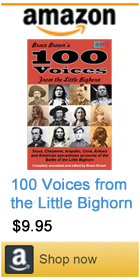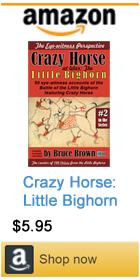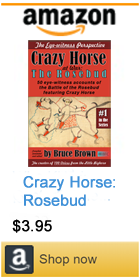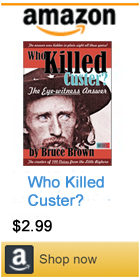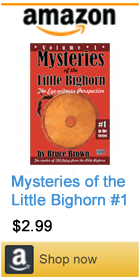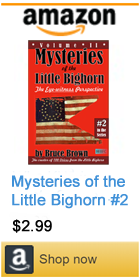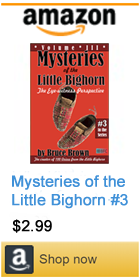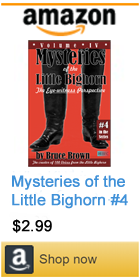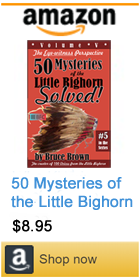|
||||||||||||
Bruce Brown's 100 Voices... Soldier's Story of the Battle, #2
SOLDIER'S NARRATIVE
Reno's scout, William Baker, Forked Horn, Young Hawk, One Feather went up Powder and across to Tongue. On this we discovered an abandoned Sioux camp, and Forked Horn advised Reno that Sioux too many.... We went up the Rosebud just beyond site of Bozeman fight and then turned back ... and met Custer. Custer sent five back to Powder River with dispatches. I wanted to go back to Powder with dispatches because my father Horns in Front was sick then, and I wanted to see him, but Custer would not let me go.2 I had a good looking horse but he was lazy. Starting at the lone tepee we began the charge. My horse was slow and I was left behind. I have always been sorry that I did not get an opportunity to fire a shot in that battle. A messenger3 met the general, and Custer took off his buckskin coat and tied it on behind his saddle. Custer rode up and down the column talking to the soldiers. The soldiers cheered and some tied handkerchiefs around their heads and threw hats away. They gave a big cheer and went ahead, but my lazy old horse straggled behind. I saw where we had crossed the river, and I was long way behind the soldiers. There were other stragglers between me and Custer. The ones nearest to me were White Eagle and Bull. Stabbed was behind, came up behind me and explained that he had been out with a message to soldiers over to east (Benteen). Stabbed had a lot of Winchester cartridges in a feed bag, which he gave me to take along. He said there were many Sioux and there would be a big fight, and if he came back he would stay with me and we would make a stand. Stabbed had a Winchester. I had a long infantry gun with two bands. I, White Eagle, and Bull followed Custer and five companies. We came upon a white soldier4 whose horse had given out, and he was kicking the horse and striking him with his fist and saying "Me go Custer. Me go Custer." [Note: here are an Anonymous Ree and Peter Thompson's accounts of similar occurances, perhaps even of the same downed horses.] As we went up a little dip we looked over and saw the valley full of Sioux tepees, and I would estimate that there were eight or nine big circles. The first (Hunkpapa) camp was breaking up. If I had had a good horse, I probably would have kept up to Custer and been killed with him. I soon came across a second soldier whose horse was down, overcome by heat, and he could not get him up and was swearing and calling him a son of a bitch and kicking him. Just after this I saw Ree scouts who had captured horses come up the ridge and Strikes Two said: "Leader, I will give you this spotted horse that is leading the herd." Where they came up the river ran right along the foot of the bluff. Strikes Two said, "Don't take him out. We will drive the whole herd together back to lone tepee." We started back and saw the pack mules coming along by lone tepee. Again my horse could not keep up, and Red Star came up behind me and said, "Uncle, do you see that mouse-colored horse with a white belly? I captured him and you may have him, so take care of him." I took him and brought him back to our reservation, and he lived many years on Ft. Berthold reservation. I was following the herd back toward lone tepee. We came to the two soldiers whose horses had given out. They were together and on foot on the side of the hill. Five Sioux came up, following us. These two soldiers became separated and the Sioux circled them and we supposed killed them both. [Note: one of the soldiers was Peter Thompson, who miraculously survived to win the Medal of Honor.] We drove the horses back and met the packs. I was still behind. When I got up to them, all of the Rees had picked fresh horses and changed, and Red Star was riding the big horse that Strikes Two wanted me to ride. I then picked a spotted one, and when I got saddled up, I followed back to bluff over river. When got there could not see any fighting going on and thought that fighting must all be stopped. Soon we saw survivors of valley fight coming up the ridge. Little Brave's spotted horse came up with the rest. Red Bear came straggling up without any shoes, and the boys picked the prickly pear prongs out of his feet. I soon recognized Bobtail Bull's horse. Strikes Two remarked that Bobtail Bull must have been killed in the fight. Horse had bridle, saddle, and blanket tied to horn of saddle. I went to [Fred] Gerard and showed him Bobtail Bull's horse, and Gerard told us to catch him. I went and took the blanket and said I would keep it. Horse had a curbed bit and fancy trimmings. Stab took the bridle. Horse had no picket rope. Stab proposed that we follow the ridge toward where Custer had gone. We did so. Sioux were coming and getting around us before we got to end of ridge. A group of soldiers stood on the ridge behind us. The party was Stab, Strikes Two, Boy Chief, Strike Lodge, Little Sioux, Soldier, Karu, Watoksha, Mahcpiya Sha, and Cross. The Sioux now attacked us and drove us and the soldiers, and we went back beyond the lone tepee. Stab was riding one of the two captured mules, and his own horse was put in the captured herd. A band of Sioux pressed us hard, and one of them painted red, riding a bay horse with bald face, nearly caught up with us. Piece of yellow cloth tied on his hair. We agreed to go ahead aways and turn around and fight. I took a shot at him, and he dodged. That was all the damage I did him. He was so close that others of us shot at him, and Stab claimed he had hit him, as he acted as if hit. This Sioux now turned and rode back on the trail we had come. Years afterward, a Sioux, Plenty Crow, from Cheyenne River Reservation, verified the fact that this was Cheyenne and that we had hit him. From this point westarted toward the Powder late in p.m. but before sundown. Struck Rosebud before dark. Mahcpiya Sha caught a black Sioux horse just before we reached the Rosebud. This was an intelligent horse, smelled of the ground often, and he followed the back trail well. We traveled all night to site of old Sioux Sundance (mouth of Lamedeer Creek near where agency now is) and got there (mouth of Lamedeer Creek) at daylight June 26. We did not stop here but kept on. We stopped once and shot sage hens and cooked them. This was the only time our horses grazed until we got to mouth of Rosebud. There we got old moldy crackers. The party that brought the captured herd from Little Bighorn were Share, White Eagle, Whole Buffalo, Bull, Bull Water, Red Bear, Red Star, One Feather, and Red Wolf. There were eight with the horses and ten in our party on way back to Powder. When we were eating this hardtack (early in morning) at mouth of Rosebud, Black Fox overtook us, leading a horse. He had run away with the Crows and left them and overtook us. [Note: The Crow scouts said they didn't see Black Fox after Custer excused the scouts from further service part way down Medicine Tail Coulee.] The Crows told him how to get to mouth Rosebud. We now had eleven in our party (including Black Fox), as follows: Soldier, Stabbed, Strikes Two, Boy Chief, Strike Lodge, Little Sioux, Karu, Watoksha, Mahcpiya Sha, Black Fox, and Billy Cross, called "Ieska," [or E-esk, who] rode a buckskin. The party of eleven got to Powder River first. Billy Cross, Watoksha and Tonhechi Tu5 left its at mouth Rosebud and beat us a little in reaching Powder River camp ... The remaining eight stopped at Tongue and camped. We got to Powder a little after noon. Never heard of a horse playing out in either the party of eleven or party of eight while on way back to Powder. Four or five days after we got to Powder, steamboat arrived with wounded soldiers. Goose (Ree) was among these wounded. My eyes went on the bum and Stabbed gave me a lump of alum. I applied it and it nearly burned my eyes out but they improved right along. Major Moore,6 in command of this camp, the Rees called White Hat [Chiskoku Taka]. A party of us were detailed to carry mail to mouth Rosebud to meet remnants of Custer's command. We met a party of our own Rees carrying messages in opposite direction, and Chakawo [or Chakaboo, AKA Billy Jackson] was in this party. When we got to camp at mouth Rosebud, we found our Rees all in rags, their clothing all worn out. Crows and Crow women were here. Aftersome days the whole camp moved up the Rosebud opposite the gap and were told Sioux were coming, and we were all ready to fight when soldiers came and met us. At the end of this interview I was showing Soldier pictures of officers. He recognized nearly all of them and commented on recollections of several of them. When I showed Soldier picture of Lieutenant Cooke, he kissed it, saying that he was a lovable man, his very breath being nothing but kindness. Walter Mason Camp's Notes: 1. Walter Camp field notes, folder 54, BYU Library. Soldier was an Arikara Indian born in 1831. He enlisted for the thirteenth time on April 26, 1876, at Fort A. Lincoln. He was with the Reno column on June 25 but was left behind on the march because his pony was in poor condition. He did not cross the river into the valley fight, but returned to Yellowstone Depot. 2. Peter Beauchamp says that when Custer was negotiating to enlist the Ree Scouts, there was opposition on the part of the societies among the Rees. This opposition was because of a dislike which the societies entertained for the chief, Son of the Star. The opposition of the societies was so strong that the men who went to Ft. Lincoln to enlist had to steal themselves away when they left the reservation. (Walter Camp field notes, folder 54, BYU Library.) 3. This may have been one of the two messengers from Reno. The first messenger was Private Archibald McIlhargey and the second was Private John Mitchell, both of Company I. Both were killed with Custer. 4. Notice that in Soldier's story he says nothing about the first soldier's horse being down- merely that he could not get him along. (Walter Camp field notes, folder 54, BYU Library.) 5. Tonhechi Tu was a Blackfoot Sioux Indian scout, also known as Bear Come Out (Appearing Bear), and The Whole Buffalo (Buffalo Body, Buffalo Ancestor). 6. Orlando H. Moore, major, 6th Infantry, was in command of Yellowstone Depot on the Powder River. Custer in '76: Walter Camp's Notes on the Custer Fight, edited by Kenneth Hammer, Brigham Young University Press 1976 p 187 - 191
Here is another account by Soldier. For more information on Custer's scouts, please see The Twisted Saga of the Unsung Seventh Cavalry Scouts. -- B.B.
|
||||||||||||



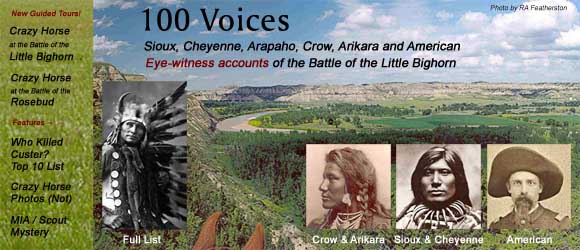
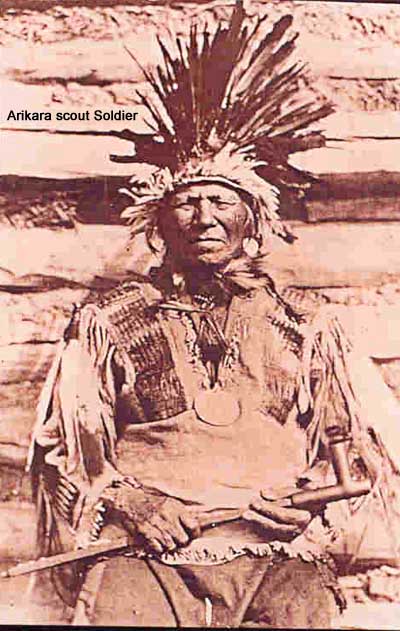 ON WAY to Little Bighorn we camped third night on abandoned Indian camp and found a stone with two bulls drawn on it. On one bull was drawn a bullet and on the other a lance. The two bulls were charging toward each other.
ON WAY to Little Bighorn we camped third night on abandoned Indian camp and found a stone with two bulls drawn on it. On one bull was drawn a bullet and on the other a lance. The two bulls were charging toward each other. 